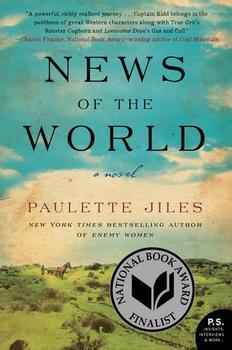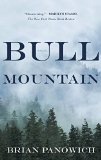Summary | Excerpt | Reading Guide | Reviews | Beyond the book | Read-Alikes | Genres & Themes | Author Bio

History is not static and staid, merely cataloged events that happened to other people. At least author Winston Groom doesn't think so. His signature fictional creation, Forrest Gump, routinely found himself in the maelstrom of historical events and much to the delight of readers – and movie audiences – even interacted with icons such as President Kennedy and MLK Jr.
Groom's latest takes similar liberties with the past: this time the stew is cooking in Mexico in the early twentieth century. Groom juxtaposes his fictional characters against lesser-known, but real figures – General Pancho Villa, who was part of the Mexican revolution (see Beyond the Book), and even Hollywood actors and American authors who were known to have gone looking for adventure in Mexico. The real-life players in El Paso might not be instantly recognizable, but Groom retains a sense of mystique about them as he stirs the pot with colorful characters, and tosses in generous doses of high-voltage action, all served on the hypnotic canvas of Mexico's Sierra Madre Mountains.
As the novel unfolds, we learn that the gringos might not be directly meddling with Mexican politics, but have been silently buying up swathes of land to create a noticeable presence. In the early part of the twentieth century, The Whitneys, the Hearsts, the Harrimans, the Guggenheims and more owned practically the entire northern part of Mexico, which they exploited for ranching, farming, railroads, mining and the like, stoking resentment among revolutionaries like Pancho Villa. The fictional Shaughnessys of Boston are one such family. Practically broke, the "Colonel" and his (adopted) son, Arthur Shaughnessy, must figure out a way of keeping their company, New England & Pacific Railroad Company, afloat. Rumors of a revolution in Mexico, a country where they have millions of heads of cattle, only rattle their nerves more.
In what later turns out to be an undeniably regrettable decision, the Colonel decides he will bring the entire family: his own wife; Arthur and his wife, Xenia, and their young children, Kathleen and Timmy; and bodyguard Bomba, to Mexico. The trip will be a break from Boston and allow the men to take stock of the situation on the ground firsthand. But even before they get to their ranch, Valle del Sol, they learn that the dreaded Pancho Villa has already paid a visit to the property and killed the manager. Further shaken, the Shaughnessys decide their best course of action is to move all the cattle to safety in the American border town of El Paso.
Even under the best of circumstances, such adventure would not be for the faint of heart. But the volatile political landscape conspires in such a way as to test the family at every turn. The revolutionaries and their special brand of crazy; the punishing (yet dramatic) countryside; and the Shaughnessys' own pitfalls create a mesmerizing cocktail of action and uncertainty as each side tries to outwit the other in this Western updated for contemporary times.
As it turns out the Shaughnessys are not the only ones hot on Pancho Villa's trail. Three different sets of fighters slowly track him across the hostile Sierra Madre in what plays out like an elaborate game of Risk.
Groom takes his time, diving into the past history of the Shaughnessys, their Irish heritage making them something of a Johnny-come-lately on the Boston Brahmin scene; following them across their perilous journey while they brave the elements; unwinding the story systematically and efficiently. Tossed into the melee are close encounters of the nasty kind: bullfights; rattlesnake and gila monster bites; jaguar attacks; and more.
Real-life historical figures such as writer Ambrose Bierce and journalist John Reed make longish cameo appearances as they follow General Pancho Villa along on his exploits. Groom knows how to spin an old-fashioned yarn and El Paso is as entertaining as they get with plenty of wild adventure. As a diverse set of parties chases down the ever-elusive General though, one does begin to tire of the scenery and wishes the showdown, if there ever is to be one, would get here already.
In his zeal to toss plenty of color into the story, Groom might have overspiced the brew a bit. There are so many swashbucklin' characters – Lieutenant Crucia, Fierro, Slim, Cowboy Bob, Ah Dong, Bomba, Johnny and Donita Ollas, Crosswinds Charlie (to name a few) – it gets progressively more difficult to remember who fits in where in the puzzle. What's more, having taken his time in setting the stage and taking a hold of the action, it seems as if Groom suddenly has more people than he knows what to do with, and so dispatches many to their fates summarily and dare I say, rather conveniently.
Given how tightly the novel unfolds over its many hundreds of pages, Groom might be forgiven for a somewhat lazy ending as he tries to corral an unruly novel back into its pen. Cinematic, sprawling, and exploding with (occasionally brutal) action and color, El Paso will probably lasso in many lovers of the genre who will delight in Groom's meticulously narrated story.
![]() This review was originally published in The BookBrowse Review in November 2016, and has been updated for the
September 2017 edition.
Click here to go to this issue.
This review was originally published in The BookBrowse Review in November 2016, and has been updated for the
September 2017 edition.
Click here to go to this issue.

If you liked El Paso, try these:

by Paulette Jiles
Published 2017
It is 1870 and Captain Jefferson Kyle Kidd travels through northern Texas, giving live readings to paying audiences hungry for news of the world. An elderly widower who has lived through three wars and fought in two of them, the captain enjoys his rootless, solitary existence.

by Brian Panowich
Published 2016
Winner of the 2015 BookBrowse Debut Author Award
From a remarkable new voice in Southern fiction, a multigenerational saga of crime, family, and vengeance.
Your guide toexceptional books
BookBrowse seeks out and recommends the best in contemporary fiction and nonfiction—books that not only engage and entertain but also deepen our understanding of ourselves and the world around us.